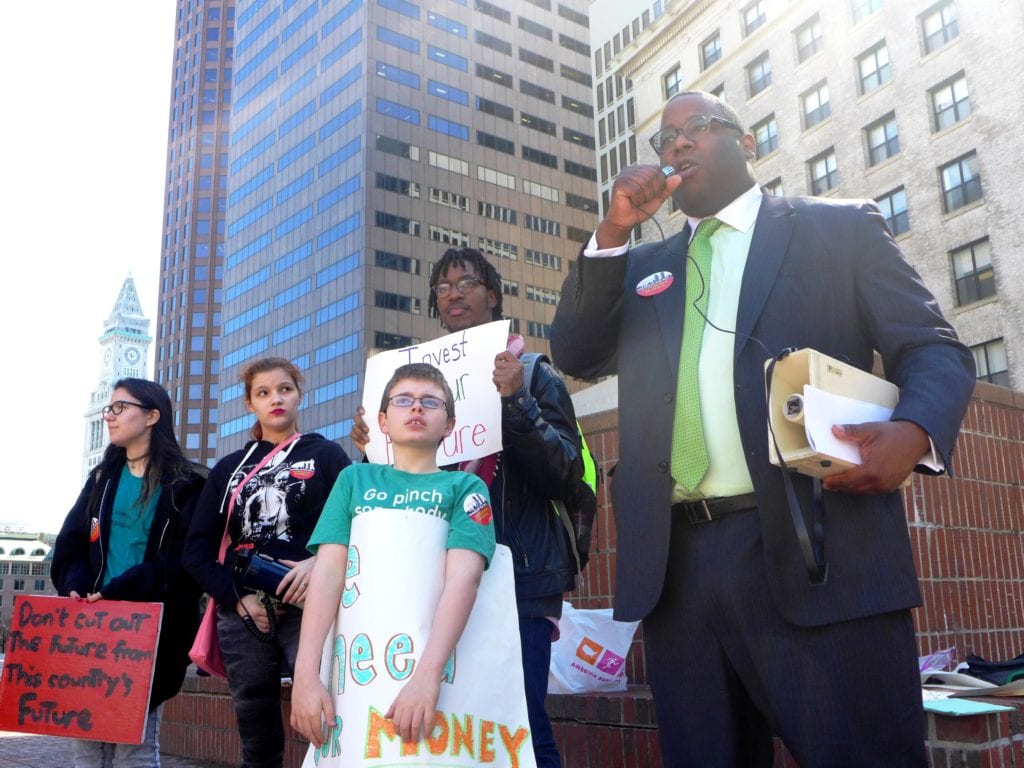
“If it wasn’t for Diploma Plus, I would now either be a drug dealer, a gang member, or dead,” said Luis Aponte, a graduate of Charlestown High’s program for high risk students at a March Boston Public Schools budget hearing. Diploma Plus escaped next year’s budget ax because a private company stepped in to fund it after our City refused. Luis is now a Northeastern University student. A five-year-old kindergartener stood in front of the Boston School Committee one week later. She simply said, “Please fund my school.”
This Wednesday, when I am asked to vote on the BPS budget, I will remind myself of their words.
A budget is a value statement.
We have a choice. Do we aid our young Davids, or favor well-heeled Goliaths?
“Here we go,” you might say. “A grandstanding city councilor, trotting out the ‘Oh! The poor children!’ line to score political points.” It’s always a little awkward for any elected official to plead that rather than be the stereotypical, do-nothing fat cat, they are actually trying to do the job taxpayers pay them to. But awkwardness aside, as chair of the Committee on Education, I’m supposed to look out for the families of the Boston Public Schools. That is why I voted against Boston’s proposed schools budget on June 8th, and will do so again until the cuts are rescinded.
Boston stands at a profound crossroads. Either we block the path of prosperity for our young people and their families, or we forge their path anew so they prosper with dignity.
Three out of four school-aged Boston children call our 125 school communities a second home. The nation’s oldest public school system is their birthright; we are all its guardians.
Though unprecedented wealth abounds, FY17’s proposed budget cuts to the bone what’s left of BPS. We must acknowledge what our suburban neighbors understand: striving for a quality public education is expensive.
Our NAEP scores, the “Nation’s Report Card,” ranks us as one of the nation’s top two large urban public school systems. We have 37 level 1 and 2 schools. Our kindergarten program surmounts the achievement gap.
Noteworthy, given half our 57,000 BPS students live in households whose first language is not English though testing requires its mastery. One in five students have disabilities. Over 75 percent are economically disadvantaged, 86 percent are students of color. Four thousand are homeless. After years of cuts, they already lack basic resources.
BPS is far from perfect. But refusing to fund the looming $26m-$38m deficit won’t help. Instead, the City deflects, saying the proposed appropriation is the largest in the history of BPS. True: 381 straight years of increased funding. In fact the City gave former Interim Superintendent John McDonough, a decades-long veteran of BPS, $38m. Superintendent Chang, who has barely had time to unpack his Lakers jersey during this his first budget cycle, initially got just $13.5m, then at the very end, a further $4.68m.
Of 347 Commonwealth municipalities, 332 have spent more on their education district as a total percentage of their budget than Boston. Boston hires consulting companies who charge $22,000 a slide to tell us $18,318 per pupil is too lavish a sum to waste on our children. Cambridge proudly spends $27,163. Wellesley, Lexington, Newton, Lincoln, Sudbury, Swampscott, Milton, all have fine, well-resourced schools, with accomplished well compensated unionized teachers, mostly women.
Next year, BPS students with autism face an 8 percent cut despite increased enrollments. Elementary students with social-emotional impairments, or trauma, face a 21 percent cut.
The West Zone ELC that eliminates the achievement gap, Dorchester’s Lee School where one in three students have autism, East Boston’s Guild where 68 percent of students are English language learners, Young Achievers School, even Boston Latin School, all of them will have deep budgets cut.
Several high schools will lose their librarians, and so their accreditation.
Of course more central office cuts are possible. But after years of austerity, we face cutting access to basic transportation, nurses, custodians, even toilet paper.
The state’s foundation formula is broken. That is where the long term solution lies. But Boston too must admit that we have $115m in net new revenue. Mayor Menino never had that. A portion of the $100m parking fund is available. Capital budgets, not operating budgets, should fund capital projects. The City wants to spend $670,000 to rebrand the BRA instead of funding Roosevelt, Brighton High, Manning, Lyndon, and Excel High students. We have the money.
Our budget is our value statement. If we deny our young people, we surely not only devalue them, we devalue ourselves. Let’s together build a path to dignity for all.






